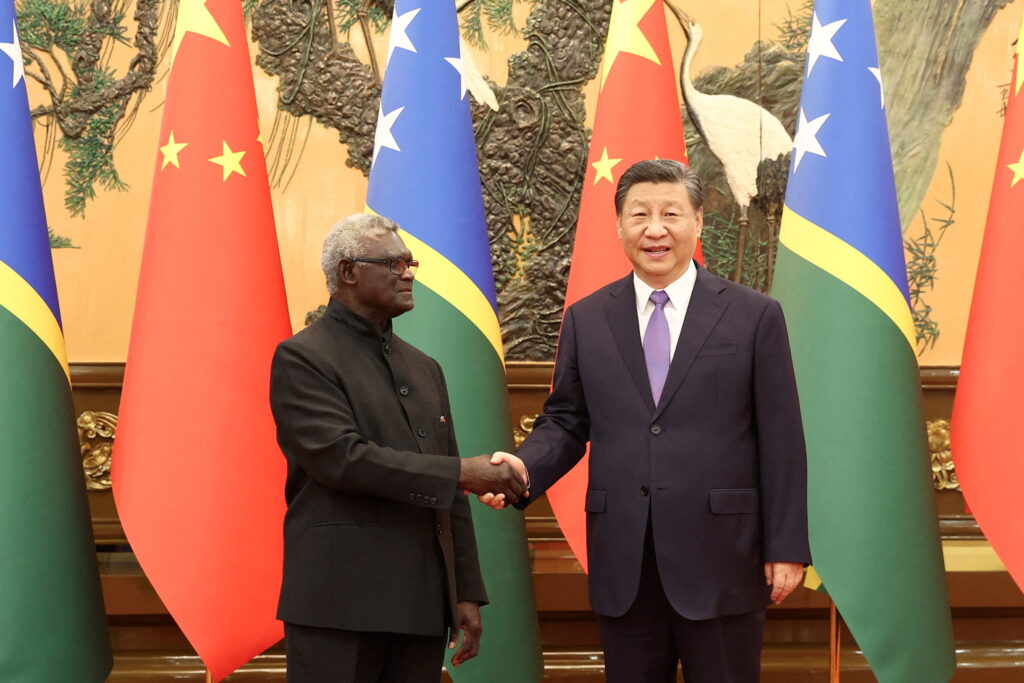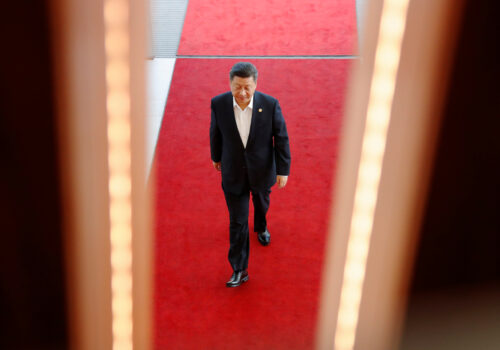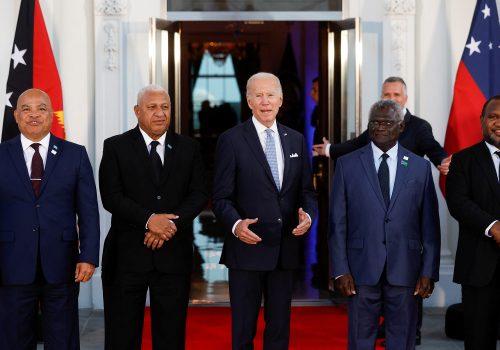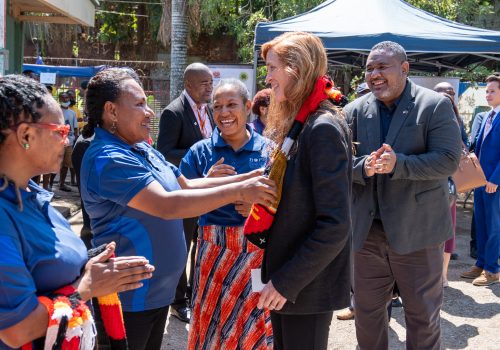While this month’s elections in India and South Korea will draw more global attention, it’s worth keeping an eye on an election in a small South Pacific nation. The Solomon Islands, with a population of 724,000, has come to have an outsized impact on geopolitics due to its strategic position within the Melanesian archipelago and its 2022 security agreement with the People’s Republic of China (PRC). On April 17, the country will hold pivotal parliamentary and provincial elections.
Prime Minister Manasseh Sogavare delayed this election, initially scheduled for last year, under the justification that the administrative burden of hosting the 2023 Pacific Games was too great to carry out the election in the same year. But many saw the delay for what it was—Sogavare buying more time to consolidate power and boost his chances for reelection.
The contest is a competitive one, and the results will determine whether the country continues growing its relationship with the PRC or changes course in favor of a different approach.
Sogavare’s warm embrace of the PRC
Since withdrawing his country’s diplomatic recognition of Taiwan in favor of establishing formal ties with the PRC in 2019, Sogavare has aligned himself with Beijing on matters of foreign policy. This shift has drawn concern from countries such as Australia and the United States, which are competing with the PRC for influence in the country and the wider region.
Whether Sogavare’s embrace of the PRC is driven by transactionalism or ideology depends on who you ask. Some see him as playing larger powers off each other to extract maximum benefit, while others see him as driven by an anti-Australian worldview informed by his own nationalism and long-standing criticism of the Australian-led peacekeeping mission that extricated the country from state failure.
Others have astutely observed that these are not mutually exclusive motivations and that his motive may ultimately boil down to something that drives politicians the world over: securing, consolidating, and maintaining power. As Patricia O’Brien wrote, “Sogavare will continue to act in ways that serve his ultimate purpose, to remain in power. This unfortunately also serves China’s sweeping regional ambitions.”
Domestic backlash and electoral politics
Sogavare’s “look north” policy has drawn criticism domestically from prominent politicians such as opposition leader Matthew Wale, as well as former Malaita Province Premier Daniel Suidani, whose critiques of the PRC contributed to his removal from office last year by the provincial assembly. But this seemingly clear-cut divide is an “oversimplified understanding” of critics’ positions, which are intertwined with complex ethnic and social divisions rooted in the country’s colonial history.
On the campaign trail, Sogavare has touted his “look north” policy as bringing much-needed development aid and, on the heels of hosting a successful Pacific Games—for which the PRC provided much of the infrastructure—boosting his country’s prestige in the region. He has also praised the PRC’s political system while criticizing Western democracy.
Sogavare’s opponents have actively contested the issue, with Wale accusing the prime minister of “selling out the country to foreign interests” and slamming him for having “prioritized the Pacific Games over medicines.” If elected, Wale has floated holding a nationwide referendum on the country’s relationship with the PRC, but he has also left the door open to maintaining some degree of relations with Beijing.
Thus, the election presents an inflection point for the Solomon Islands’ relations with the PRC. As Sogavare seeks a fifth cumulative term in office, will voters award this gruff and wily political survivor for his embrace of Beijing or remove him in favor of politicians who are promising a different approach?
The political landscape and electoral system
Candidates from thirteen political parties are contesting the parliamentary election, and 120 of 334 eligible candidates are standing as independents. The country has a weak party system; as the Development Policy Centre’s Terence Wood explained, “voters rarely vote along party lines in Solomon Islands: they vote based on individual candidate attributes.” Candidates’ loyalty to their parties is fickle, with their allegiance often up for grabs after election day.
Any one party is unlikely to win an outright majority, so the victor will need to secure coalition partners to form a government. Thus, Sogavare and Wale aren’t the only players who merit observation; other figures, such as Peter Kenilorea Jr., will certainly factor into the formation of the government.
Voter motivations and key issues
While personality politics predominate, policy issues do register with voters. Domestic issues—reducing poverty, increasing physical and digital connectivity, creating employment opportunities, improving health and education systems, and more—are front of mind for voters. Foreign policy is typically discussed through the lens of domestic matters, and voters are unlikely to base their vote choice on foreign policy.
Public opinion and young voters
It is challenging to speculate about ground-level public opinion from afar due to the lack of publicly available polling. Seventy-four percent of the population lives in rural areas flung across the country’s 147 inhabited islands, making it a difficult place to poll. This is compounded by wide variations in turnout from election to election, a key data point to nail down in any survey seeking to gauge voter sentiment.
One wild card is young voters who have reached voting age since the 2019 election. Candidates and parties are seeking to capitalize on this by appealing to a seeming desire for change; for example, Kenilorea and his party have embraced a youth-centric campaign. But at this stage it is unknown whether young voters’ collective behavior will meaningfully differ from that of other age groups, or if they will fall into more traditional voting patterns.
Election day and the uncertain aftermath
All eyes are on Sogavare as April 17 approaches. At this stage, he seems to be favored to return for a fifth term, but this outcome is not certain. Moreover, his fate is unlikely to be known immediately; in 2019, it took three days for official results to be announced after the election. The “election after the election,” which lasted for three weeks in 2019, will quickly come to the fore as candidates and parties jockey for power.
During this opaque period, pre-election alliances and loyalties tend to be discarded in favor of fresh inducements that make it difficult to predict outcomes. As Wood wrote, “there will also be the post-election horse-trading amongst MPs hopping between Honiara hotels that leads to the selection of the prime minister, and the public reaction to this opaque and unaccountable process.”
Post-election civil unrest, which was seen after the 2019 elections, could transpire and potentially influence the formation of a government. Since gaining independence in 1978, the country has been bedeviled by ethnic and social tensions that have often resulted in violence, most recently in 2021 when riots rocked Honiara, particularly impacting its Chinatown district.
Geopolitics comes into play here, as quelling violence has often required the deployment of foreign security forces. Police from Australia, Fiji, New Zealand, and Papua New Guinea will be utilized to provide security around election day, and the 2021 riots were only extinguished upon the deployment of police from Australia, who may be called upon again if tensions flare.
The deployment of PRC police is also possible under a policing agreement signed in 2023, which was justified by Sogavare in the name of diversifying partnerships and “plugging security gaps” made evident by the 2021 riots. Apprehensions also linger about underhanded PRC efforts to influence post-election negotiations, and Beijing’s track record lends credence to these worries.
Cumulatively, these factors portend a tense and uncertain post-election period, but one in which Sogavare seems poised to have the upper hand. The “coconut wireless” of social media will surely be abuzz, and the results will reverberate well beyond the borders of the Happy Isles.
Parker Novak is a nonresident fellow with the Atlantic Council’s Global China Hub and Indo-Pacific Security Initiative, where he specializes in Southeast Asia, the Pacific Islands, Indo-Pacific geopolitics, and US foreign policy.
Further reading
Wed, Apr 3, 2024
In the Pacific Islands, US delay is an invitation for China to step in
New Atlanticist By William Piekos
China’s recent efforts to lure Pacific Island governments into alignment with Beijing’s policy preferences heighten the importance of a consistent US focus on the region.
Fri, Dec 8, 2023
A pivotal contest for strategic islands in the Pacific is upon us—and it’s not about Taiwan or the South China Sea
New Atlanticist By Markus Garlauskas, Parker Novak
Time is running out for Congress to take concerted bipartisan action on agreements with Micronesia, Palau, and the Marshall Islands.
Tue, Aug 15, 2023
Showing up is half the battle, and the United States is doing so in the Pacific Islands
New Atlanticist By Parker Novak
USAID Administrator Power’s visit to Papua New Guinea and Fiji highlights the importance of high-level diplomacy and soft power in the strategically located region.
Image: Chinese President Xi Jinping and Solomon Islands Prime Minister Manasseh Sogavare shake hands at the Great Hall of the People in Beijing, China July 10, 2023. cnsphoto via REUTERS .



